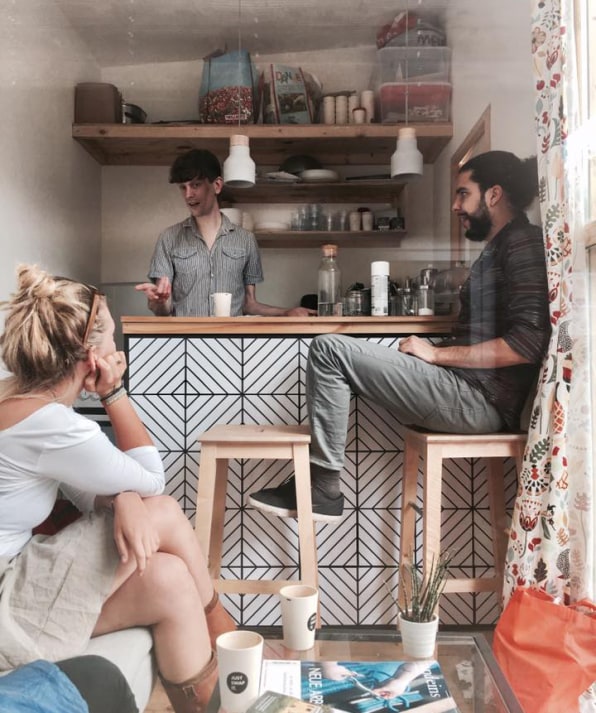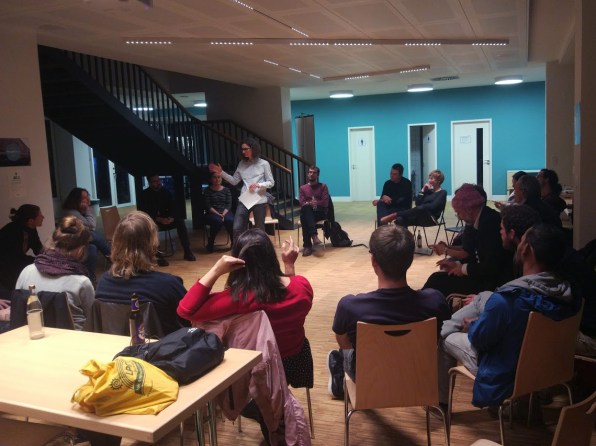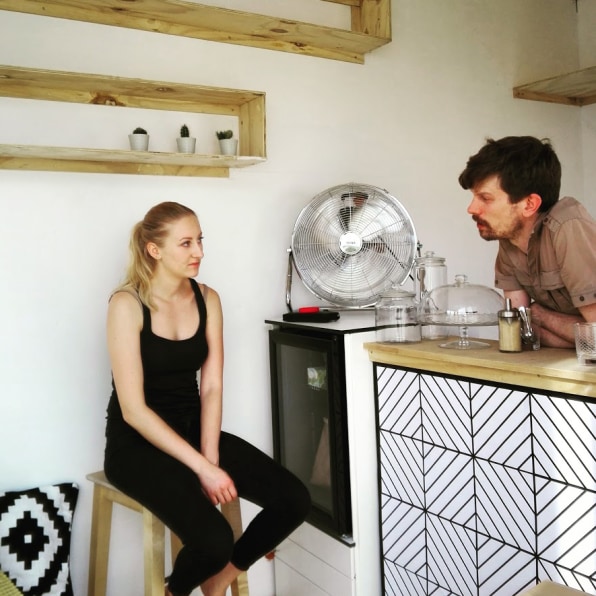The rise of cryptocurrency and the underlying technology of the blockchain have given rise to wide-eyed visions. Developers dream of techno-utopias where, perhaps, rent-seeking companies like AirBnB and Uber and Facebook are replaced by semiautonomous corporations built on peer-to-peer, decentralized cryptographic systems. Operating in parallel to this dream are legions of currency speculators seeking fortune on the blockchain; there are now some 1,300 cryptocurrencies. Rampant, sometimes unscrupulous investors have ushered in a new currency craze, whereby valuations fluctuate by thousands of dollars, sometimes even in the same afternoon.
“I think a lot of people, myself included, were much more optimistic about the revolutionary potential of bitcoin when it came along,” Ed Murphy tells me over Skype from Berlin. “Bitcoin seemed to be revolutionary, but instead of disrupting economics and promoting participation of those left out, it has become just another asset class, a volatile one, but one that has entrenched inequalities with a different financial elite.”
The 40-year old Berliner is one of the developers behind another, harder-to-find vision–one that harkens back to some of the earlier communitarian notions around bitcoin. Circles is a cryptocurrency meant to experiment with a kind of ground-up basic income, whereby every participant gets a weekly payout through the blockchain. The premise still takes the form of a question more than an answer. Can you use the math of the blockchain not to repeat the existing patterns of wealth, but rather to redistribute wealth in a fair and trackable way?
Think of Circles, which got its first test at a tiny cafe in Berlin last summer, as a cryptographically enabled system for bartering goods and services among a community, says Murphy. Or: It’s “making a local economy more like a game of Monopoly, where a person gets $100 every time they pass Go.”
As an example, Murphy points to a community co-op in Berlin that has created its own small economy by producing food and goods, while also giving people work. Typically, someone might work at the co-op’s garden for two hours a week, which allows them to buy produce at the co-op’s garden, cafe, or restaurant for half price. The co-op could convert this bartering system to Circles, says Murphy. Instead of getting discounts on food, the co-op could dispense coins that allow volunteers to not just buy food at the store, but to buy or even create some other basic necessity in the local economy.

Imagine you’re a volunteer at the co-op, says Murphy, and, like every other member, you also sign up for Circles. Every Friday, the Circles network deposits 100 coins into your wallet–and that of every co-op volunteer–a sum you can use as you see fit at the co-op’s garden, cafe, or restaurant. You could spend your coins at other participating shops, provided the shops are within your community “circle” of trust. Here, a coin would represent a unit of your work, not a standard set by a government, as in fiat currencies, or the “work” of blockchain-validating computers, as in most other cryptocurrencies.
There would be benefits for institutions like the garden co-op, too. It currently sells goods–vegetables–that its member-workers also buy, but “Circles would give those organizations a way of rewarding work without [the burden of] having to pay them minimum wage and then charge them for that produce,” Murphy says. Instead of giving people some free or discounted food, the co-op has “given them some tokens, and they can use it in a more useful way to make more trade for people locally. Maybe they would think up, ‘Oh, there is something missing in this local economy, maybe I should do X, Y, or Z.'”

Along with stimulating the local economy–an outgrowth of old ideas around so-called complementary or community currencies–the project maintains a fiercely large ambition: to provoke new thinking about how to build a basic income system that doesn’t need fiat currency, or even a government. “So many people in the basic income community have this kind of singular focus on the government to provide the basic income,” Murphy says. “And of course that makes a lot of sense, but unfortunately governments haven’t done a lot, though they are getting warmed up to the idea now. But I suspect we may be in a very, very long tunnel of neoliberal excuses to not implementing it.”
Related: The Brazen Fraud Case That May Help Determine The Future Of ICOs
Several other UBI-related projects have set their sights directly on the conventional banking system using the blockchain, including Grantcoin, Project Ubu, and Democracy Earth, of which a UBI cryptocurrency is part of a larger “borderless” peer-to-peer democracy project.
“If states were to put the [basic income] money in commercial bank accounts, the bank could use that money for what they like,” says Murphy. “They can charge you money for keeping it in there, for taking it out, and all of a sudden it’s not as revolutionary or radical as it had previously been. That’s why we’re coming at it through the blockchain.” Whether a more radical solution can also be a practical one remains to be seen.
Gift Economies
Martin Köppelmann–a blockchain entrepreneur, and cofounder of prediction markets, Fairlay (based on bitcoin) and Gnosis (based on ethereum)–originally conceived of Circles in Berlin in 2015, but it also reflects research being done in Dublin and Switzerland. It was while living in Dublin a few years ago that Murphy heard Swiss basic income activist Enno Schmidt speak at a conference, describing how he and other Swiss activists had successfully campaigned for UBI as a national referendum. The effort ultimately failed, but it forced UBI into the news cycle, with some EU member states like Finland and the Netherlands even experimenting with their own basic income system.
After his talk, Schmidt told Murphy that the single most effective part of the campaign had been a cafe in downtown Basel, Café Unternehmen, which became an important meeting space for the movement. Around that time, Köppelmann announced Circles at a talk in Berlin. Murphy was unable to attend, but he contacted Köppelmann with an idea: monthly meetings related to Circles and UBI in general. They began a meetup, Basic Income Berlin, and, inspired by Häni’s cafe, began casting around for a physical space. In June 2017 they launched a pop-up cafe, Café Grundeinkommen, as part of the Tinyhouse university project, an art exhibition at Berlin’s Bauhaus Archive Museum, turning it into a meeting space for basic income activists. Work on Circles began in earnest.
“It gave us a place to experiment with the currency,” says Murphy. In this early case, the cafe “could be seen as a gift economy, because what you’re doing is exchanging real worth—your product or service—for what is essentially a free currency.”
It was also a place to talk to anyone who’d listen about the old ideas behind Circles. The concept of a basic income has been circulating for decades as a response to a number of economic issues like unemployment, rising rent, and the continued automation of jobs. Proponents see UBI as a way of reducing and even eradicating poverty and supplying everyone with the means to meet basic necessities, both in the near and distant futures. Critics on both sides of the ideological spectrum variously worry that UBI could hurt economic output, reduce human dignity, and dull labor’s political power. In any case, a UBI would be very costly, estimated to cost in the trillions in the U.S. alone.

In many ways, however, the crypto-gift-economy envisioned by Circles is more of an outgrowth of local exchange trading systems, or LETS, a term coined in 1982 by Michael Linton, an open society systems designer who ran the LETSystem in the Comox Valley of Courtenay, British Columbia. Unlike bartering, LETS is an actual monetary or exchange system–one that allows members to exchange printed notes (“green dollars”) for work when federal dollars are scarce or even unavailable to them. Much like Circles, LETS is a complementary currency, running in parallel to national currencies. Members maintain a system, with some fees, that allow them to take jobs and get paid in green dollars, with positive and negative balance limits that encourage people to earn or spend.
Murphy says that the team researched LETS and similar systems, and that Circles itself could be seen as an innovation on the idea. He cites The Wörgl Experiment, a local stamp currency that helped put citizens of the Austrian town of Wörgl back to work in 1932, as another example of an “almost-too-successful complementary currency.”
The project, initiated by Wörgl’s then mayor, Michael Unterguggenberger, was meant to pay for public works, given that the town only had 40,000 Austrian shillings in the bank. The mayor used that sum to guarantee 40,000 shillings’ worth of stamp scrip, and launched a new local currency that required its holders to purchase a stamp scrip each month to keep the currency valid. Thus, the system encouraged holders to spend their money quickly on various projects, like new streets and a water system, which helped employ people; meanwhile, revenue raised by the stamp scrips was used to support a local soup kitchen.
One enthusiast, the prominent American economist Irving Fisher, began advising U.S. towns on introducing stamp scrips, too; by March 1933, amid the economic hardships of the Depression, as many as 1 million people may have been involved in these systems, according to one estimate at the time. Despite the interest it attracted, Wörgl’s experiment would be terminated by the Austrian National Bank on September 1, 1933; in the U.S., President Roosevelt would also prohibit “emergency currencies.”
Argentina also instituted a system of several complementary currencies, the Redes de Trueque, also known as “RT networks,” during its 2001 economic crisis. Although most collapsed by 2002 because of problems related to scarcity and inflation, several RT networks with better governance systems survived by ensuring many nodes, participants, and coordinators.
Circling The Blockchain
Could Circles succeed where these earlier experiments had failed? How exactly would it even begin to circulate among a larger community? I was still confused, so Harriet von Froreich, Circles’ communications lead, explained with an example involving basil and cinnamon buns.
She asked me to imagine I was earning a universal basic income, not in dollar, yen or euro, but in my very own and personal currency, “DJ-Circles.” Meanwhile, my friend “Harriet” gets her own basic income in “Harriet-Circles.”
“So, let’s say you’re growing the nicest basil in town on your window sill. Harriet loves basil, and offers you five Harriet-circles for some of your harvest. Because you trust her, you accept her offer.” That leaves me with two currencies in my wallet: a number of DJ-circles and five new Harriet-circles.
“You start to feel a little hungry. Harriet says that there’s a new cafe in town—and it’s accepting Circles! So you go there. Although it is your first time there and you are not connected to the cafe yet, they accept your payment and soon you’re having one of these fresh and crispy cinnamon buns in front of you.”
Behind the scenes, she says, Circles “uses the six degrees of separation principle to find trust connection paths.” In this case, “the path it found was DJ > Harriet > Harriet’s brother Jan > the new cafe.” This is a “transitive transaction,” she says. “The bun costs three Circles, so three DJ-Circles are transferred to Harriet’s account. Harriet’s account transfers three Harriet-coins to her brother Jan. And Jan’s account transfers three Circles to the new cafe’s account. The payment was successful, and every person in the chain received only currencies that they accept and trust.”
And, she says, “If you want to have more coins, you can offer your work and services, and get paid in other people’s coins, or you can sell things.” Of course, the size of your market for selling that work or those services will depend upon how widely Circles is adopted.
Murphy likens gaining traction with Circles to a levitation trick: You start with something with no value, get enough people to accept it, and suddenly it has a value since it can be exchanged for a number of goods and services.
“We call this bootstrapping, and it is probably the biggest conundrum in the game of currencies,” he says. “The difference between a currency with 0 value and one worth 0.00000000000000001 cent (or work hour, if you prefer) is almost infinite.”
To begin to create that value and get Circles coins circulating in a given local economy, Murphy hopes to entice retailers into offering a percentage of their goods or services at a given amount of Circle coins per week, as a way to promote their business.
“The retailer could say that they would (initially) offer goods to the value of 500 Circles . . . per week/month etc.,” Murphy wrote by email. “This would be a way for retailers to dip their toes into the system without taking on too much risk.” The more retailers who join the system, offering more services, the more customers join, thus enhancing a system of reciprocal trading.
The total number of coins would not be fixed, and to discourage hoarding and encourage people to actually transact in the currency, there will be a built-in 5% inflation rate, says Murphy. Like the stamp scrips of Austria’s Wörgl experiment, this feature would “act as a limit on the value of outstanding currency (limit hoarding) and to increase the velocity of money (money gets spent quicker, gets used more times, and therefore increases the use-value of the currency).”
One current focus for the Circles developers are the smart contracts that will run the currency’s validation systems. With technical help from The Rules and Consensus, two American organizations that focus on socially conscious blockchain projects, the team is thinking of running Circles on the Ethereum network. Users wouldn’t have to purchase ETH in order to use Circles, says Murphy, but there is no long-term solution yet as to who would pay for the processing of the blockchain.
Related: Universal Basic Assets Could Be The Foundation To Build An Equitable Society
The Circles team is currently in talks to test the currency at an yet-to-be-announced Berlin bar and community co-op garden. When Café Grundeinkommen reopens this spring, cafe staff will guide users through the setup process and help explain the concepts of crypto and UBI. Those users who work at the cafe or gain trust in some other way will be able to validate and spend their coins.
Along with their coffee and coins, visitors to the cafe will learn more about universal basic income, community currencies, and the basic agreements that have undergirded centuries of financial systems.
“Money is not a god or a force of nature; it’s a tool, a societal agreement,” says von Froreich. “Instead of a top-down distribution, it could be created at the hands of people directly–for example, through code. So why not create and distribute money fairly by giving the same amount to every account in a system?”